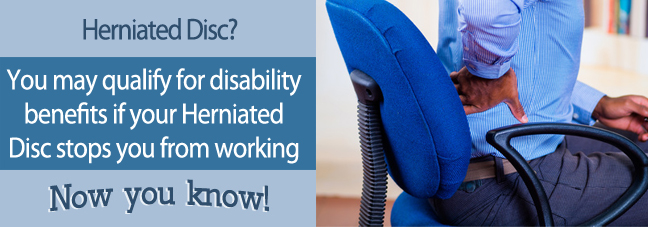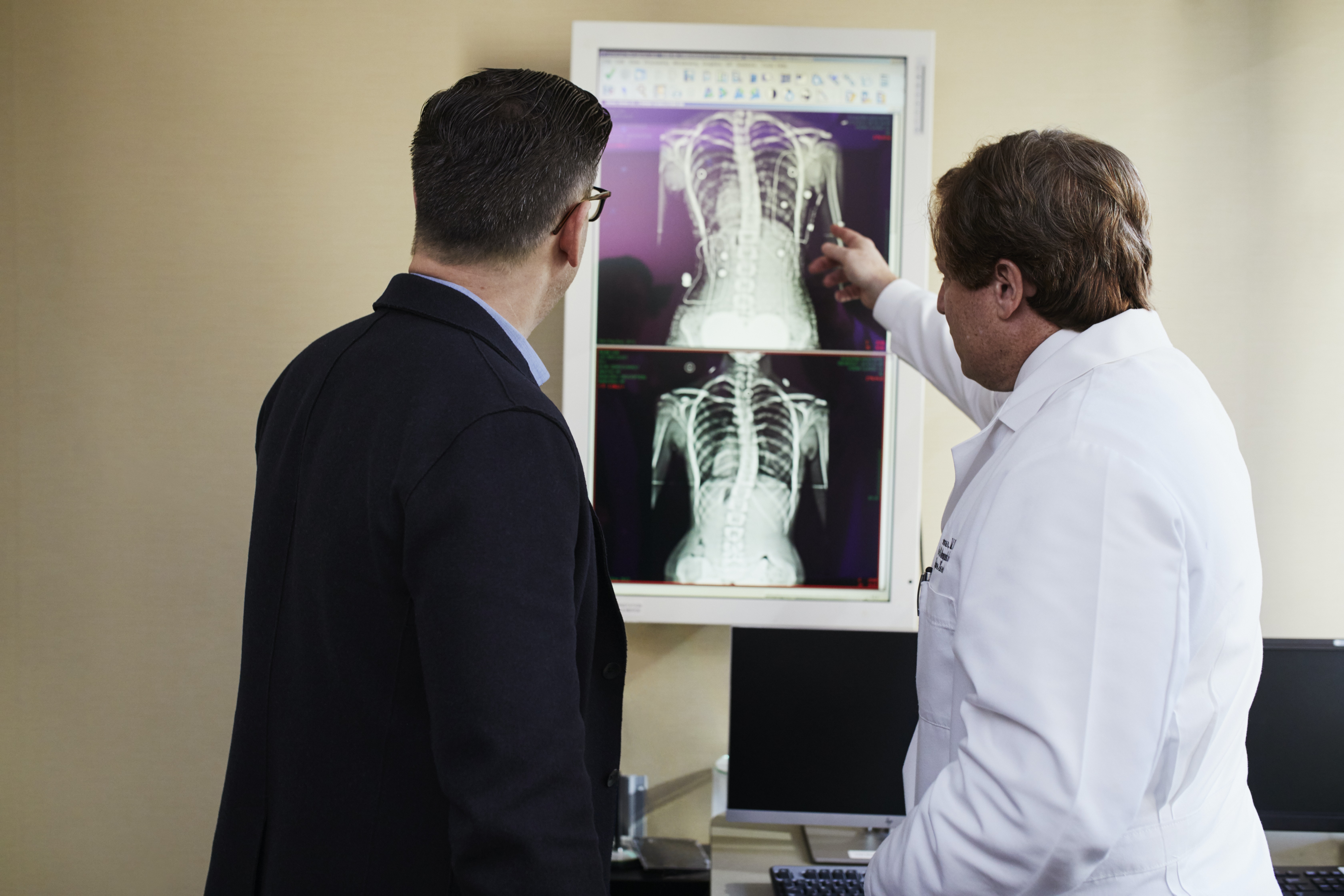If a herniated disc is causing you to suffer severe pain and experience limitations that make it unable for you to work, you may be eligible for Social Security disability benefits.
A herniated disc, which is sometimes called a ruptured disc, results from the cushioning between the two vertebrae being pushed out of its position.
This leads to nerves near the discs becoming irritated and pinched leading to compression. While herniated discs can be the result of something sudden like an accident, they can be caused from gradual deterioration.
While the symptoms that you suffer from a herniated disc can vary significantly, it can cause severely impacted mobility, debilitating pain, and numbness and tingling.
This pain may keep you from working, which means that you may be entitled to compensation. Contacting a disability lawyer will help you understand the potential benefits and how to access them. A disability attorney can help you review the SSA's Blue Book to see if you medically qualify as well as how it may keep you from working.
Can I Work With a Herniated Disc?
Herniated discs can severely limit your mobility and cause excruciating pain so your ability to perform your daily tasks, let alone your work duties, can be significantly impacted. Severe pain that originates in the back can radiate down the legs and limit your ability to walk or stand significantly.
If you experience numbness and tingling, that can also impact your ability to do normal tasks, such as bathing or dressing yourself, let alone work. Because of the impacted mobility, you may require a walker or cane so you can get around.
Severe pain often from a herniated disc requires the use of pain medications. Most painkillers cause side effects such as dizziness or drowsiness, which can make it impossible for you to drive or operate machinery. While you may choose to undergo a surgical procedure, that is not always effective in resolving the pain issues.
You may have to undergo intensive therapy and rehabilitation and still not see a significant improvement in mobility resulting in the need to frequently reposition yourself and not stand or sit in one position for more than an hour at a time which makes working impossible.
Your symptoms, particularly the pain, tingling, and limited mobility, can keep you from being able to lift, carry, or reach, which limits your normal functioning as well as your ability to maintain your job.

Limitations for Specific Jobs
With herniated discs, you would not be able to perform a variety of job tasks. You can’t work in construction, manufacturing, or warehouse jobs because they require regular reaching, lifting, and carrying. Your limited mobility and pain would make those activities impossible.
Because your pain medication causes dizziness and drowsiness, you can’t work in a manufacturing environment where you use machinery, lathes, or saws or be a commercial vehicle operator.
Because of the pain, numbness, and tingling you experience, sedentary work is impossible because of the radiating pain and feeling of pins and needles throughout your back and legs.
You couldn’t work as a heavy equipment operator or as a mail carrier because of the being positioned in a seat and how it would impact your pain and then how your pain medicine will make vehicle operation dangerous.
If you can prove you are unable to perform any kind of work and why, you are legally disabled per the Social Security Administration (SSA) guidelines.
Herniated Disc Activity Restrictions
There are a certain restrictions you may have to experience that are part of everyday activities if you have a herniated disc. Herniated disc pain that occurs in your lower back could be a mild ache or a shock-like pain that radiates into your leg.
Many common activities may inflame and make the pain worse the pain so there are some activities you should try to avoid. Sitting too much as it puts more pressure on your spinal discs, particularly when slouching forward in a seat.
As sitting cannot be avoided you should try to sit up straight with your shoulders rolled back towards the chair and shoulder blades down. You should also try to keep your thighs about horizontal with the floor. You can also use a small pillow or rolled-up towel to support your lower back.
When doing laundry it can put a lot of pressure on your back and one of the herniated disc lifting restrictions such as bending over to pick up items to be cleaned and carrying a heavy basket should be avoided. These activities should be avoided by seeking help from someone else or taking laundry requirements to a specialist cleaning firm.
When vacuuming there are also herniated disc activity restrictions because the repetitive forward-lunging motion often used when vacuuming the floor can irritate your herniated disc.
Instead of extending your arm and bending your back, keep your back straight and walk the vacuum across the floor. Think of your legs doing the work instead of your arms. Another option would be to buy a robot vacuum cleaner to do the work for you. With this device, you can set it and forget it.
When feeding your pet simply bending down to fill your pet’s bowl with food and water is sufficient to cause severe pain. If you can’t ask someone else to help you with this task you should consider buying a specialty pet bowl which includes an extended tube or built-in reaching aid.
If you have to lean over you should keep one leg extended similar to a golfer when picking up a golf ball. Doing this will help to take the stress off your lower back, because you are keeping your alignment straighter.
When undertaking strenuous exercise you should avoid taking part in more
high-impact activities that could exert too much pressure on your spinal discs. These include exercises that involve repetitive loading on your lower back, like running or using a jumping rope.
Also movements like leg presses and squats should be avoided which put significant loading on your lower back. Finally, you should avoid toe-touches, sit-ups, and yoga poses that make the pain worse and cause significant bending of the back.
In summary, someone with a disc herniation should at all times avoid any heavy lifting, any sudden pressure on the back, or repetitive strenuous activities when recovering from a herniated disc. All exercises that cause pain, or feel as though they are making the pain worse, should be avoided.
Qualifying for a Herniated Disc With the Blue Book
The Social Security Administration (SSA) will evaluate claims for Social Security disability benefits for herniated discs using the Disability Evaluation Under Social Security, commonly known as the Blue Book. The Blue Book is the list of conditions that qualify for disability. Herniated discs fall under section 1.00 Musculoskeletal System, specifically under section 1.04 Disorders of the Spine.
Under the Blue Book guidelines, disorders of the spine can be caused by anything from hereditary conditions to damage from an accident. Herniated discs are the result of the cushioning between two vertebrae from slipping out of place, resulting in pinched nerves that can lead to extreme pain and loss of function.
Given the resulting pain and limited mobility from a herniated disc, the SSA will evaluate your application and determine whether it’s appropriate to award disability benefits based on your condition.
What they’re looking for is that your herniated disc prevents you from walking or standing for a prolonged period or the inability to perform a task requiring fine and gross movements on a sustained basis.
The effects of your herniated disc must have either lasted for 12 months or are expected to last for at least 12 months in order to be considered for disability benefits.
Further Reading: What Conditions Qualify For Disability?

Qualifying for a Herniated Disc Under a Medical Vocational Allowance
One of the reasons that the Social Security Administration requires a diagnosis to have lasted or be expected to last 12 months is that some herniated discs can be the result of trauma or another condition, so the limited mobility is a temporary condition that is not expected to last.
In other cases, you might be able to perform certain tasks on a limited or modified basis, and so you would not qualify for disability benefits. You might qualify for a medical-vocational allowance.
The medical-vocational allowance is used when the SSA determined that your medical condition doesn’t fulfill all of the requirements to qualify for disability benefits but it is acknowledged that your condition will prevent you from performing all aspects of your job.
The SSA will examine your age, past work experience and your residual function capacity (RFC) along with the exertional and nonexertional limitations of your condition to determine whether the medical-vocational allowance is right for you.
Residual function capacity is the maximum amount of work that you can do based on your condition. The SSA will examine your medical documentation to determine how much work you would be able to complete as a result of your herniated disc.
Nonexertional demands include mental ability, posture and balance, and the use of your hands along with the ability to communicate orally as well as the ability to hear. Exertional demands, which would be impacted by a herniated disc, include walking, standing, sitting, lifting, carrying items or pushing and pulling something.
In the case of a herniated disc, your ability to work might be impacted by the exertional demands of the job. For example, if you work as a postal worker, your ability to perform the demands of your job would be impossible. While you might have limited mobility from your herniated disc, you might not be able to walk for long periods of time, pick up packages or stand in one place as needed.
Though you might be able to do those things on a limited basis, you wouldn’t be able to perform your job as required. This would make the medical-vocational allowance a possibility.
In order to make the determination on your case, you need to make sure that the Social Security Administration has all of your medical information and that your application is as complete as possible when you submit your claim.
What Medical Evidence You Need
When you're applying for SSDI with a herniated disc, you want to make sure you have as much medical evidence as you can. Medical evidence is key to any Social Security claim, as it will back up your case that you can no longer work full time with a herniated disc.
The Blue Book, which the informal term for the guide the SSA uses to determine a disability, has a list of medical evidence that you need for when you send in your application for Social Security disability benefits.
The SSA will want a full report of the examination of the spine that includes, but not limited to:
- The range of motion of the spine in degrees from a vertical position (zero degrees)
- A detailed description of a person’s gait
- Signs of tension and Presence of muscle spasms
- Hand grip and pinch strength
You are able to access the entire Blue Book online, there it will include more medical evidence you need for your herniated disc case.

What Happens If My Condition Worsens Over Time?
If left untreated, a herniated disc can get worse over time. Potentially leading to more permanent damage to your spine and nervous system. Because a herniated disc can get worse, this can impact your social security benefits in a couple of ways. If you have not yet applied, continuing to work can put extra strain on your back making it difficult to recover. Even if you are able to work now, if the condition is getting worse, there will be a point where you are unable to continue doing your job. If this is the case for you, consider getting started with the application process immediately.
A worsening condition can also affect you if you have already applied for disability benefits. It is important to know that you are able to apply for disability benefits multiple times. Therefore if you have been denied previously, that does not mean that you cannot apply again. One of the most common reasons for denial is that you were not able to prove that your condition made it impossible to make a living at the time. This could be due to lack of medical evidence, or that you were unable to meet the Blue Book listings. As the condition changes, that means that you will have the opportunity to gather new medical evidence. Be sure to keep track of all doctors diagnosis as well as any predictions about the progression of your back injury.
It is important to know that if your herniated disc does get worse, that does not mean that you will be given more in disability benefits. Disability benefits are based on your previous work history and not the severity of your condition.
Bulging Disc vs Herniated Disc
Bulging discs and herniated discs are similar. Both are conditions that affect the discs in between the vertebrae of the spine. These discs act as shock absorbers throughout the back and allow for the mobility of the spine. The main difference between the two is the severity of the condition. While both can be painful, a bulging disc is generally less severe. However, if left untreated or if overused, the bulging disc can become a herniated disc.
Both a bulging disc and a herniated disc are caused by general wear and tear on the back that happens over time. As one ages, the discs in your back become less and less flexible. This means that something minor can cause the condition to occur and even worsen. If you have a bulging disc, it is important that you are able to get the proper treatment because it will often get worse with age and use.
If you have been diagnosed with a bulging or herniated disc, it is important that you start the disability benefits process immediately. Needing to take significant time off of work is common with these conditions. Unfortunately, if you need to take time off of work for proper recovery, your bills do not stop. That is why it is important to get started with the disability benefits process today.
Bulging Disc Work Restrictions
If you have a bulging disc, or bulging discs, your doctor may implement certain work restrictions so that you don’t injure yourself further at work. Your doctor’s recommendations may make it impossible for you to do your current job. If those work restrictions and accommodations for those restrictions make it so that you cannot perform your job, then you will be able to apply for disability benefits. Some common restrictions that doctors recommend for people with bulging discs are:
- Not lifting boxes or anything over a certain weight limit, like 25 pounds.
- Not bending, twisting, or moving your body in any way that exacerbate the bulging disc.
- Not sitting for long periods of time at a computer or workstation without being allowed to get up and move around.
- Not performing any rigorous repetitive movements that could make pain worse.
If your doctor implements restrictions like these which impact your ability to do your job, you may qualify for disability benefits. For example, if your job involves lifting boxes up to a high shelf or unpacking crates from trucks, and you cannot lift anything over five pounds because of the restrictions recommended by your doctor, you will be eligible for disability benefits. Or, if your job requires that you sit at a computer all day and you cannot sit for long periods of time without making your bulging disc worse (even if you have a special cushion or a special chair), then you will be eligible for disability benefits.

How to Apply for Social Security Benefits with a Herniated Disc?
If herniated discs have made working impossible for you, you may be ready to apply for Social Security disability benefits. There are several different ways you can choose to start the process.
You can go online to the Social Security Administration (SSA) website and start the application or call the SSA at 1-800-772-1213 and ask to start your application over the phone.
You can also schedule an appointment at your nearest SSA office to go get things underway in person. To prove your case and get your claim approved, you need to provide as much documentation as possible to back up your claim and show your diagnoses and the severity of your symptoms.
Talk to Social Security Attorney
If you seek the counsel of a Social Security Attorney, you are much more likely to have your claim approved. An attorney can be hugely beneficial; you will have a competent professional fighting on your behalf to get the benefits that you deserve.
Additional Resources
- What Conditions Qualify For Disability
- What Is SSI?
- SSDI Application
- SSDI
- SSI
- Disability Lawyer
- Can You Get Disability If You Haven't Worked Enough
- Should I Apply for VA Benefits or Disability Benefits?
- 3 Tips for Winning Your Disability Appeal with a Herniated Disc
- Blue Book
- Why Your Herniated Disc May Have Been Denied
- Applying for Social Security with Herniated Disc